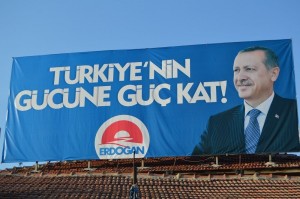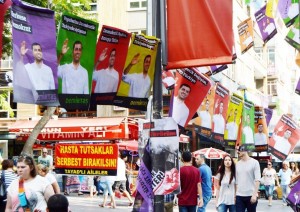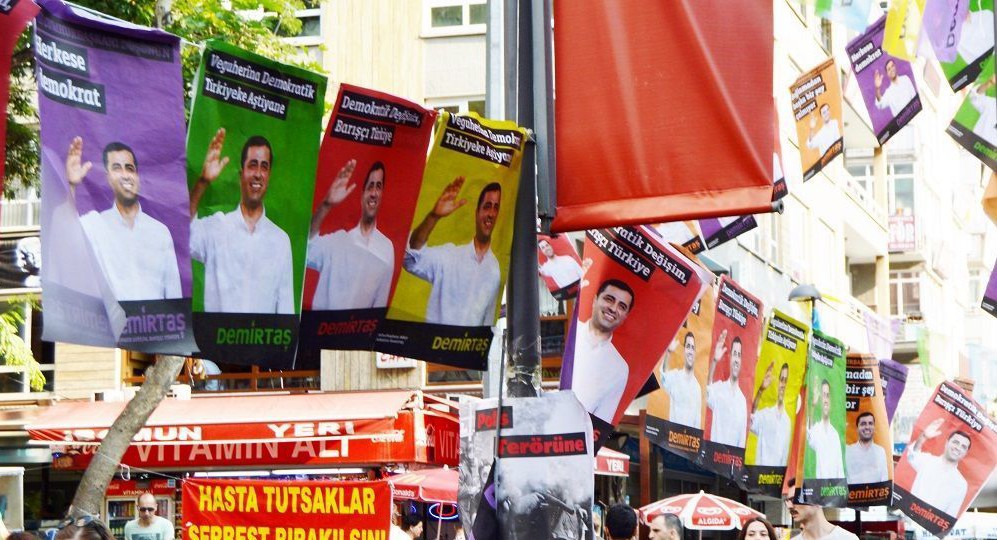In the past week of unseasonably wet weather, campaign posters like a plague of mushrooms have sprouted across Turkey, a country gearing up for its first direct presidential election on August 10. Almost overnight, Prime Minister Recep Tayyip Erdogan’s solemn, resolute face was plastered on nearly every billboard, installed in nearly every advertising column and hung from banners on buildings in local and regional metropoles. The faces of his opponents – Ekmeleddin Ihsanoglu, of the Republican People’s Party (CHP)/National Republic Party (MHP) coalition, and Selahattin Demirtas, from the Kurdish People’s Democracy Party (HDP) – too, are evident, peering out hopefully from between Erdogan banners and on the internet – but make no mistake. When it comes to campaigning, this is a one-man show.
Despite his increasingly authoritarian tendencies, Erdogan is widely expected to beat out his two challengers for the presidency. The popularity he and his Justice and Development Party (AKP) enjoys among conservative lower- and middle-class Turks, Kurds, and Turkey’s neoliberal elite is so vast that the only question is whether he’ll win outright on August 10 with over 50 percent of the vote, or whether the election will be forced into a run-off later this month. The overwhelming amount of Erdogan publicity on display in Turkey is just one indicator that Erdogan, far from being worried about his prospects for the presidency, hopes to engineer such a conclusive first-round victory that he will possess an indisputable mandate to pursue AKP priorities – and expand his own power while he’s at it.

Photo by Katherine Long
Erdogan’s campaign propaganda hints at his plans for the presidency. For all that his sun-over-fields logo resembles Obama ’08’s hope-and-change motif, his posters and slogans portray him as, if anything, a bully, shaking down Turks for their vote. “Turkey relies on you,” accompanied by a frowning and expectant Tayyip, is a paternal shrug: “Sure, don’t vote for me, but I promise you won’t like what comes next.” To opposition supporters, the same slogan is facetious, said in full knowledge that Erdogan will win no matter what they do; Erdogan’s frown is transformed into a mocking Mona Lisa smile – “Turkey relies on you? As if!”
Two are particularly militaristic: “National will, national strength” and “Strengthen Turkey” seem designed to inspire both fear and a sense of wartime resolve. And with Iraq and Syria sinking further every day into an intractable morass, Cold War II breaking out on Turkey’s northern border and the disappointments of the Arab Spring still fresh in Turks’ minds, the idea that Turkey needs a strong leader, an “iron-willed” leader, as Erdogan describes himself, to guide them through regional turmoil is not such a tough sell. His rallies in the past week have shown that to a tee: In Istanbul last Saturday, 2.4 million people turned out to hear the prime minister give a bombastic speech.
Even the timeline of the campaign has been subject to Erdogan’s wishes. Turkish election rules decree that candidates can only begin campaigning 30 days before the election. In that 30-day period, every candidate is granted an equal amount of time to appear on television and radio. It’s an attempt to level the playing field that privileges candidates with smaller war chests – but Erdogan convinced the Supreme Election Board to open the official campaign period only ten days before election day, cutting the airtime of his lesser-known opponents by one third and giving himself twenty extra days of high-profile prime ministering during Ramadan. Indeed, the entirety of Erdogan’s campaign has been remarkably blatant about his aspirations for a centralizing presidency, an authoritarian presidency. Yet every poll has him winning 50 to 55 percent of the vote on election day.
But Erodgan’s camp has made tactical missteps in the past week as well. At the start of the official campaign period on July 31 – when candidates are allowed to begin advertising, holding rallies, and appearing on radio and television in support of their campaign – the only women in his posters were wearing headscarves, alienating secular and non-Muslim supporters. A whole series of posters describing Erdogan’s infrastructure improvements and development plans received a tepid reception and have all but disappeared – It’s probably not wise, his campaign decided, to remind voters of the corruption and graft scandals linked to Turkey’s rapid growth in construction over the past decade. A video advertisement released on Tuesday was axed by Turkey’s high court for violating the ban on religious imagery in campaign material.
In several of his speeches, Erdogan has pushed hard on religious and ethnic tensions. He has compared Israel’s most recent campaign in Gaza to the Holocaust, called on his opponents to campaign openly under the banner of the sectarian identities, and denigrated Armenians and Alevis. In a rally on August 7, he singled out female Economist correspondent Amberin Zaman for “insulting a society that is 99 percent Muslim,” calling her “shameless” and “dishonorable.” Zaman had asked CHP leader Kemal Kilicdaroglu in a televised interview whether he thought Muslim societies were able to question authority.
Not that any of this seems to have harmed him much. The number of pro-Erdogan posters is only one indication that this is a very lopsided race. National radio and television stations are allocating hundreds more minutes to Erdogan than to his rivals, and Erdogan is able to use government resources to campaign. But even despite the foul play, Erdogan has an unshakable base of support. His popularity with voters stems largely from his victories as Prime Minister, a post he’s had since 2004. In particular, Turkey’s hugely successful national healthcare law, an economy buoyant throughout the 2009 financial crisis, and the plethora of patronage jobs resulting from Erdogan’s massive infrastructure projects attract lower-class voters and Kurds to his camp. His liberal economic policies win him the support of wealthy investors. And then there’s something more difficult to pin down: For all his disregard for democratic process, Erdogan is indisputably charismatic.
If Erdogan is taking up all the campaigning air, Ihsanoglu is rapidly suffocating and Demirtas has decided to just hold his breath. Ihsanoglu’s grandfatherly face and rather weak “Ekmeleddin for bread, sowing the seeds of love” slogan is getting its fair share of play on billboards and street corners, but his campaign has walked into a terrible trap: the design for his posters is exactly the same as for Erdogan’s. On a larger scale, too, Ihsanoglu’s admittedly scattered message gets lost – or even worse, subsumed – in Erdogan’s media cascade. His kindly speeches attract crowds, but in nowhere near the numbers of Erdogan’s rallies. Part of the issue is that his message is diluted and diffuse. “The president does not build roads, but lead people,” he has said. Unfortunately for him, he’s been unable to define just where he wants to lead Turks to.

Demirtas, the self-described “most handsome candidate” is only expected to pull in eight to ten percent of the vote.
Photo by Katherine Long
Meanwhile, Ihsanoglu’s party, the CHP, has been trying every parliamentary and legal maneuver they can think of to make an anti-AKP splash, if not a substantive dent. In the past week, CHP deputies have brought one lawsuit, one formal complaint, and a vote of no confidence against high-ranking AKP officials, including Foreign Minister Ahmet Davutoglu and Erdogan himself – purely symbolic gestures, as government officials possess official immunity from arrest, detention and prosecution. Demirtas’s message is getting substantial play in Kurdish regions in Turkey’s southeast and leftist neighborhoods in major cities, but polls show him gaining no more than 8 or 10 percent of the vote.
The main impact of a first-round Erdogan win is expected to be on the constitutional amendment process, which has been stalled in parliament for the past year. Erdogan hopes to change the country’s fundamental law to give more power to the presidency – and with a mandate to rule from the people, he’s expected do just that by appointing a strong ally as prime minister, likely Ahmet Davutoglu, who can whip Turkish MPs into line behind Erdogan.
Should Erdogan be successful in these efforts, his red herring struggle against a so-called “parallel state,” would likely take a turn for the worse – giving him expanded powers to restrict civil liberties and imprison journalists. The conflict originated last winter when prominent government officials, including Erdogan himself, were accused of circumventing tender rules and zoning laws, bribing media groups and laundering money. In response to these allegations, the AKP has launched a counter-attack against the group it deems responsible – the “parallel state.” To combat the threat posed by Pennsylvania-based Islamic scholar and philanthropist Fethullah Gulen’s teachings, the AKP has arrested policemen and prosecutors investigating the corruption scandal, sacked anti-AKP military commanders, and restricted the use of social media. Should Erdogan successfully expand the powers of the presidency, this suppression of dissent is likely to only intensify.
As the United States watches Erdogan campaign to what appears to be an inevitable victory, one thing is certain not to change – Erdogan’s open disregard for the United States. Erdogan has admitted that he and Obama no longer talk, and, as Erdogan grows increasingly authoritarian, we might see a trickle-down effect to lower-level officials as well. This could become increasingly problematic for the United States, as Turkish-US relations have historically been close: In 2009, President Obama called the Turkey-US relationship a “model partnership” and the economic ties between the two nations have grown over the past decade. And as America edges closer to a rapprochement with Iran, as ISIL continues its devastating rampage through Iraq and Syria, as Russia turns the Black Sea into its personal bathtub, Turkey’s important role in protecting American interests in the Middle East and Eurasia will only become more vital. If the race for the presidency is any indication, it seems that Erdogan, and the quasi-dictatorship he hopes to create, will be around for a long time. How the US will reconcile Turkey’s immense strategic importance with the reality of its authoritarian government remains to be seen but one this is certain – Erdogan’s election to president will only make reconciliation more difficult.
